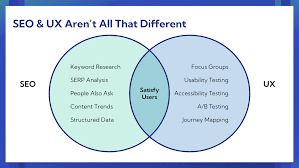The Relationship Between SEO and User Experience
Search Engine Optimization (SEO) and User Experience (UX) are two crucial elements that go hand in hand when it comes to creating a successful online presence. While SEO focuses on improving a website’s visibility in search engine results, UX is all about enhancing the overall experience of visitors on the site. Let’s explore how these two aspects intersect and why they are essential for any digital strategy.
Website Usability
One of the key factors that affect both SEO and UX is website usability. A well-designed site that is easy to navigate not only keeps visitors engaged but also helps search engine crawlers index your pages more effectively. By ensuring a seamless user experience, you can reduce bounce rates and increase the time users spend on your site, which are positive signals for search engines.
Mobile-Friendliness
In today’s mobile-centric world, having a mobile-friendly website is no longer optional – it’s a necessity. Search engines like Google prioritise mobile-responsive sites in their rankings, as they provide a better experience for users accessing the web on smartphones and tablets. By optimising your site for mobile devices, you not only improve your SEO but also cater to the needs of your audience.
Page Speed
The loading speed of your website plays a significant role in both SEO and UX. Slow-loading pages not only frustrate users but also impact your search engine rankings. Search engines favour fast websites because they deliver a better user experience. By optimising images, reducing server response times, and leveraging browser caching, you can improve page speed and enhance both SEO performance and user satisfaction.
Quality Content
Content is king when it comes to both SEO and UX. Creating high-quality, relevant content that addresses the needs of your target audience not only attracts organic traffic but also engages visitors once they land on your site. By focusing on creating valuable content that resonates with users, you can improve dwell time, increase social shares, and earn backlinks – all of which are vital for SEO success.
User Engagement Metrics
Metrics such as bounce rate, time on page, and click-through rate are indicators of how users interact with your site – and they matter for both SEO and UX purposes. Search engines consider these metrics when evaluating the relevance and quality of your content. By monitoring user engagement data and making improvements based on user behaviour patterns, you can boost both search rankings and user satisfaction.
In conclusion, SEO and User Experience are intrinsically linked aspects of digital marketing that work together to create a holistic online presence. By focusing on providing valuable content, enhancing usability, optimising for mobile devices, improving page speed, and tracking user engagement metrics, you can achieve success in both areas simultaneously.
“Prioritising User Experience: The Pivotal SEO Factor of 2021”
“Enhancing SEO Through Optimised User Experience Factors”
4.
- How does SEO impact user experience?
- Why is user experience the most important factor for SEO in 2021?
- How to improve SEO with user experience factors?
- Is UX the same as SEO?
- Do UX designers do SEO?
- How does SEO and UX work together?
- What is user experience in SEO?
How does SEO impact user experience?
The impact of SEO on user experience is profound and multifaceted. SEO plays a crucial role in directing organic traffic to a website, ensuring that users can easily find relevant content through search engines. By optimising for keywords, meta tags, and site structure, SEO enhances the visibility of a site in search results, attracting more visitors. A well-executed SEO strategy not only brings users to a website but also influences their experience once they arrive. Factors such as page speed, mobile-friendliness, quality content, and user engagement metrics all contribute to the overall user experience, making SEO an integral part of creating a seamless and satisfying journey for visitors on a site.
Why is user experience the most important factor for SEO in 2021?
In 2021, user experience has emerged as the most critical factor for SEO due to its direct impact on how websites are ranked and perceived by search engines. Search engines like Google increasingly prioritise user-centric elements such as website usability, mobile-friendliness, page speed, and quality content when determining search rankings. A positive user experience not only leads to lower bounce rates and higher engagement but also signals to search engines that a website is valuable and relevant to users. By prioritising user experience in 2021, businesses can not only improve their SEO performance but also enhance overall customer satisfaction and drive sustainable online growth.
How to improve SEO with user experience factors?
Improving SEO with user experience factors involves creating a website that not only ranks well in search engine results but also provides a seamless and engaging experience for visitors. By focusing on enhancing aspects such as website usability, mobile-friendliness, page speed, quality content, and user engagement metrics, you can positively impact both SEO performance and user satisfaction. Ensuring that your site is easy to navigate, loads quickly, offers valuable content, and keeps users engaged can lead to higher search engine rankings, increased organic traffic, and ultimately, a more successful online presence. By prioritising user experience alongside SEO strategies, you can create a website that not only attracts visitors but also keeps them coming back for more.
Is UX the same as SEO?
The frequently asked question, “Is UX the same as SEO?” often arises in discussions about digital marketing strategies. While User Experience (UX) and Search Engine Optimization (SEO) share common goals of enhancing a website’s performance and visibility, they are distinct concepts with unique focuses. UX primarily concerns the overall experience and satisfaction of website visitors, encompassing factors like design, usability, and content relevance. On the other hand, SEO concentrates on improving a site’s search engine rankings through strategic tactics such as keyword optimization, backlink building, and technical enhancements. While UX and SEO are interconnected in influencing a website’s success, they serve different purposes in ensuring a positive user experience and driving organic traffic to the site.
Do UX designers do SEO?
When it comes to the intersection of SEO and user experience, the question of whether UX designers do SEO often arises. While UX designers primarily focus on creating intuitive and engaging user interfaces that enhance the overall experience of website visitors, their work can have a significant impact on SEO. UX designers play a crucial role in ensuring that websites are user-friendly, accessible, and optimised for conversion – all factors that contribute to improved search engine rankings. By incorporating SEO best practices into their design decisions, UX designers can create websites that not only look great but also perform well in search results, ultimately benefiting both user experience and SEO efforts.
How does SEO and UX work together?
When it comes to the relationship between SEO and User Experience (UX), the synergy between these two elements is fundamental for a successful online strategy. SEO focuses on improving a website’s visibility in search engine results, while UX is all about enhancing the overall experience of visitors on the site. By aligning SEO practices with user-centric design principles, websites can not only attract more organic traffic but also provide a seamless and engaging experience for users. Optimising for both SEO and UX involves creating high-quality content, improving website usability, ensuring mobile-friendliness, enhancing page speed, and monitoring user engagement metrics. Ultimately, the collaboration between SEO and UX results in a well-rounded digital presence that not only ranks well in search engines but also delights users with a positive online experience.
What is user experience in SEO?
User experience in SEO refers to the overall quality of a user’s interaction with a website from a search engine perspective. It encompasses various elements such as website usability, mobile-friendliness, page speed, content relevance, and user engagement metrics. In the context of SEO, prioritising user experience means creating a seamless and engaging journey for visitors that not only satisfies their needs but also aligns with search engine algorithms. By focusing on enhancing user experience through factors like intuitive navigation, fast loading times, high-quality content, and engaging design, websites can improve their search engine rankings and ultimately drive more organic traffic.


